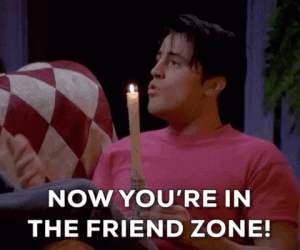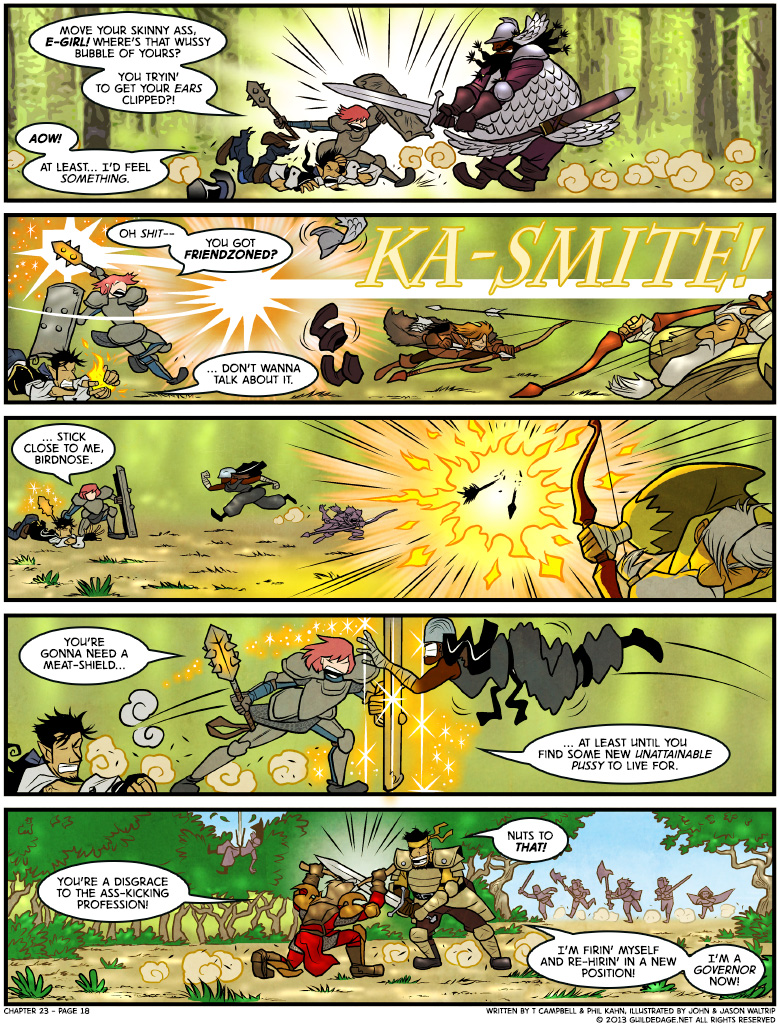Annotated 23-18
 Thank God for John and his ability to keep this lively action sailing along.
Thank God for John and his ability to keep this lively action sailing along.
“The friend zone,” much like the show that popularized its usage, has gone through some reassessment since the 1990s. To some people, including Daniel Radcliffe and some of my friends, it connotes entitlement and misogyny. “She put me in the friend zone! How dare she, that bitch! I deserve to be in her EROGENOUS zones! I’m a good guy!”
I always felt like that was giving the worst of society more power over our language than they deserved, and not entirely fair to Friends, either. True, some of the show’s underlying assumptions are not the wokest today, but its casting alone presented men and women as equally relatable and worth rooting for. Nothing about its definition of “the friend zone” suggested a woman didn’t have the right to put a man there. The zone is inside her mind, and she owns her own mind. Everyone categorizes everyone else, as “potential partner,” “friend,” “guy whose stuff I read,” “asshole,” or whatever. If I pick a category for someone, I get less interested in revising my choice the more time passes, and the same applies to the way other people look at me.
(My wife shrugs and adds, “Yeah, I got friendzoned by guys a lot. You learn to deal with it.”)
Sometimes you just have to accept that the language has changed, but I’m sorry to see this term tainted, because it certainly helped me understand some of what I was doing wrong. If nothing else, it represented an improvement over the romcom-inspired strategy of “just be her friend, just always be there for her (clapclapclapclapclap), and one day, one day she’ll see…”
The verb form “friendzoned” is maybe a little easier to associate with the angry internet. But Frigg has always used language from the angry internet, so having her use it is in line with her character, no matter how you look at it.











“E-girl” has a real and completely different meaning now, and I’m not sure if that makes Frigg’s line more or less funny.
More. Definitely more.
As I see it, “the friend zone” is a neutral term. How you react to being in it is what matters. Like if you feel entitled to get out of it and into a “better” zone, that is a problem. But just as a reference that you are friends and nothing more it is neither good or bad in my opinion
I mean, it also somewhat influences how you think about building relationships, if you let it.
I have used a past connection as a friend as a bridge to a closer relationship, for my part. And (once I got past the cultural conditioning to force me to acknowledge that there is a “friendzone,” which was annoying – and then the idea that everyone has one – which is false) I was never concerned about being “in the friend zone,” because it was always my intention to stay there with anyone who was worth my time.
That relationship’s venn diagram actually expanded; it didn’t stagnate or evaporate, as many I’ve heard complain about the friend zone seem to automatically assume will happen. (If they even want it to continue, after the “dishonor” they act like arriving in the zone places on them. Which I think is a bit egotistical.)
But, sure, perhaps there was the friend zone – and then there was the friends with benefits zone, the commitment zone… it certainly is all about how you react to someone else’s mental categorization of you, but sometimes “friend” isn’t actually the zone either of you think it is to begin with, and sometimes it’s simply incorrect to assume that’s where you’ve been put.
All in all, the “friend zone” is an abstract concept that isn’t universally applicable or mutually exclusive with a closer relationship, which is exactly why building your relationship philosophy around it is ill-advised. It never existed in a vacuum, to begin with – so can’t be the end-all-be-all of “what to avoid when you want to get with someone”.
There’s a term for being friends. It’s “being friends”.
“Being friendzoned”? Not a neutral pseudonym for “being friends”.
True, but we do live in a culture that currently tends to favor verbing nouns (ex. “I Googled the term ‘verbing'”).
I suppose someone could just as easily say “Dude, she friended you?” But I’m not sure if that carries the same bias or not.
The way the term is mostly used is by people who wanted to get a little closer than friendship and then realize they can’t. It’s based on some people’s observation that once you’re friends with someone, all romantic options are off the table. The conclusion from that, of course, is that if you want to start a romantic relationships, you should avoid becoming friends, which in turn opens the door to bad behaviour.
I, for my part, have been pretty good friends with several romantic interests of mine, and it _was_ occasionally difficult to bear, but how would I ever sustain a relationship with someone I’m not also friends with? I ended up marrying my best friend, and so did my wife. Can recommend. Turns out that knowing and respecting each other is way more important for a trustful relationship than the ability to seduce fleeting acquaintances. Not that the seduction part was useless, but it’s just not as relevant if you’re serious about long-term relationships, and if it’s being hindered by mutual respect, then maybe you have the wrong technique.
If someone puts me in the friend zone that means I have a friend. Yay!
Regardless of her choice of words, I thought Frigg’s inference of events based on E-Merl’s line – in the middle of a fight, no less – was remarkably, even uncharacteristically, empathetic. Perhaps evidence that she had an eye on E-Merl already at this point.
I don’t know… Having seen quite a few people of both sexes pass up potential relationship opportunities with good friends they already had a solid bond with merely out of fear of “ruining it” only to then go hook up with total losers who were totally wrong for them and obviously never going to work out simply because the inevitable failure of that relationship would hurt less than the potential failure of an attempted relationship with their good friend.
I was always under the impression that it was this kind of thing that “friendzoned” referred to. No sense of entitlement, just despair that something potentially wonderful is being deliberately overlooked out of fear and lack of trust, and the alternative chosen is something doomed to cause pain and misery.
lesswrong.com has several articles about the short-circuits in human reasoning that cause the underlying phenomenon. Certainty of small pain being seen as preferable to tiny chance of large pain, and the potential benefits not being properly factored into the equation is a common failure mode in our instinctive reasoning.